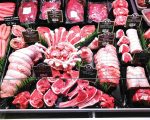By Riad Beladi

Riad Beladi is a seasoned veteran with three decades of experience in international export marketing. With an impressive track record, he has played a pivotal role in assisting the California Department of Agriculture and some of the world’s largest companies in successfully venturing into new markets. His expertise and insights have been instrumental in bridging the gap between these entities and untapped international markets, allowing them to expand their global footprint and reach a broader customer base. Beladi’s deep understanding of international trade dynamics, combined with his strategic acumen, has made him a valuable asset in facilitating market entry and driving growth for clients looking to capitalize on international opportunities. His extensive experience is a testament to his ability to navigate the complexities of global commerce and drive impactful results in the field of export marketing.
Algeria’s potential for export remains significantly hampered by its limited marketing strategies and a lack of knowledge in international communication and public relations. Despite possessing valuable products and resources, the country struggles to effectively promote its exports on the global stage. The absence of a well-defined marketing strategy and an understanding of international communication and public relations means that Algeria is missing out on opportunities to establish itself as a key player in international markets. To fully leverage its export potential, Algeria needs to invest in marketing and develop a comprehensive understanding of the intricacies of international communication and public relations, ensuring that its products and resources reach a broader and more receptive audience on the global trade platform.
Algeria, the largest country in Africa and the Arab world, is a nation of vast potential. Despite its expansive territory and a diverse range of climates, Algeria has yet to harness its full capability as a major food exporter. The country’s rich agricultural heritage and natural resources have been underutilized for various reasons, including a historical dependence on oil and gas revenue. In this article, we will explore the untapped potential of Algeria in food exports and the challenges that need to be addressed for this potential to be realized.
Agricultural Diversity
Algeria’s geographic diversity offers an array of climates, from Mediterranean along the coast to desert in the south. This diversity allows for the cultivation of a wide range of crops, including cereals, fruits, vegetables, and even some high-value crops like olives, dates, and citrus fruits. However, the agricultural sector has not reached its full potential. The country continues to import a significant portion of its food needs, which presents a missed opportunity for boosting the economy through exports.
Water Resources
One of Algeria’s major challenges is water scarcity. Water is a precious resource, and the agricultural sector consumes a significant portion of it. Efficient water management and irrigation systems are essential for agricultural development. The government needs to invest in sustainable water practices, such as drip irrigation and improved water storage, to make the best use of this limited resource.
Modernization and Technology
Modernizing the agricultural sector is crucial for enhancing food production and quality. Outdated farming techniques, inadequate infrastructure, and limited access to technology have hindered the sector’s growth. By introducing modern farming practices, machinery, and technology, Algeria can significantly increase its food production and quality. This modernization can lead to a surplus that can be exported to international markets.
Diversification and Value-Added Products
Algeria has traditionally focused on staple crops like cereals, which do not yield high profits in the global market. Diversifying into high-value crops and value-added food products is vital for boosting export potential. This could include producing and exporting processed goods like olive oil, dried fruits, and preserved vegetables. By adding value to its agricultural products, Algeria can enter more lucrative markets.
Trade Barriers
Trade barriers, both in terms of tariffs and non-tariff barriers, often hinder Algerian farmers and producers from accessing international markets. To unlock the export potential, the Algerian government should work on reducing these barriers, negotiate trade agreements with other nations, and seek ways to promote Algerian products abroad.
Political and Regulatory Stability
Algeria has experienced political instability in recent years, which can create an uncertain environment for agricultural investment and development. A stable political environment is necessary for long-term planning and investment in the agricultural sector. The government must establish clear, consistent policies and regulations that encourage investment and growth in the agriculture industry.



